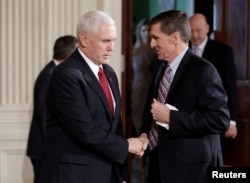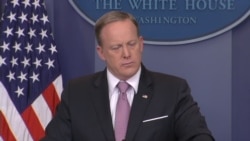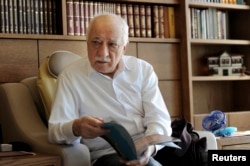The White House confirmed Friday that President Donald Trump's transition team was aware before January's inauguration that Michael Flynn, Trump's choice to be national security adviser, might be required to inform authorities he was acting as an agent on behalf of a foreign government.
Trump's spokesman, Sean Spicer, said the president had not been told earlier of Flynn's ties to the government of Turkey, which paid Flynn's firm $530,000 last year.
Flynn, a retired U.S. general, advised the Department of Justice this week that he represented Turkey last year. Flynn had previously informed Congress that he was lobbying on behalf of a Dutch firm, but did not mention his work for the Turkish government, as required by U.S. law. Flynn's filing was done on a retroactive basis.
Flynn took over as U.S. national security adviser when Trump took office on January 20, but was dismissed less than a month later; White House officials said Flynn failed to tell Vice President Mike Pence about meetings he had last year with Russia's ambassador to Washington, when former President Barack Obama was still in office. Flynn and the envoy, Sergey Kislyak, discussed sanctions that the Obama administration had imposed on Russia, it was later revealed.
'Trump was not informed'
Reporters peppered Spicer with questions Friday about Flynn, Trump, Pence and the Turkish lobbying incident. The president's spokesman said an attorney for Flynn contacted an attorney for Trump's transition team to ask whether the national security adviser-designate was obligated to report his activities involving Turkey to the appropriate U.S. authorities.
Attorneys on Trump's team told Flynn's lawyer it was up to him to decide whether Flynn must take further action, and that Flynn did seek further counsel, Spicer said.
WATCH: Spicer Discusses Transition Team, Flynn
However, Flynn’s attorneys said they twice told Trump’s legal counsel team of his possible plans to register as a foreign agent, according to The Washington Post.
The first time was in a conversation with Don McGahn, Trump’s counsel, before the inauguration and then in a conversation with another member of the White House legal team in the early days of the new administration’s early days, the newspaper reported Friday, attributing the information to "someone with knowledge of the situation speaking anonymously to discuss private conversations."
The Associated Press also reported Saturday that Flynn's representatives had a second conversation with the White House counsel's office after the inauguration, and they made clear the national security adviser would indeed be registering as a foreign agent with the Justice Department, according to a person with knowledge of the discussions.
Asked specifically whether "the president was informed at all about this arrangement" that Flynn had with the Turkish government, Spicer said, "No, he was not."
A questioner asked Spicer about U.S. Representative Elijah Cummings of Maryland, a Democrat, who "sent a letter to Mike Pence during the transition informing him [about Flynn's ties to Turkey]." Cummings is said to have advised Trump's running mate that this was a controversial, "red flag" issue. Pence was reported to have said this week that he had no knowledge of the letter, but Spicer, saying "just so we're clear," interjected: "Now what [Pence] said was that he was not aware of the filing" in which Flynn declared he was a foreign agent.
Flynn's firm was hired three weeks after the Republican National Convention last July to investigate Fethullah Gulen, who lives in the U.S. state of Pennsylvania. A former imam in Turkey, Gulen is blamed by Turkish President Recep Tayyip Erdogan for conspiring to topple him in a military coup that failed last year.
Exiled imam or radical Islamist?
Flynn was listed as the author of a lengthy story published on Election Day last year by The Hill, a Washington newspaper that is widely read in U.S. political circles. Flynn's article, headlined "Our ally Turkey is in crisis and needs our support," extolled Turkey's status as a vital U.S. ally and denounced Gulen as a "shady" cleric who "portrays himself as a moderate, but ... is in fact a radical Islamist."
The Hill has appended a note to Flynn's article on its website, saying that it was unaware of Flynn's lobbying activities before this week.
"Four months after this article was published," the newspaper advised its readers, "General Flynn filed documents with the federal government indicating that he earned $530,000 last fall for consulting work that might have aided the government of Turkey. In the filings, Flynn disclosed that he had received payments from Inovo BV, a Dutch company owned by a Turkish businessman with ties to Turkey's president, and that Inovo reviewed the draft before it was submitted to The Hill. Neither General Flynn nor his representatives disclosed this information when the essay was submitted."
Flynn's lawyer, Robert Kelner, writing to the Justice Department this week, explained that his client decided to register retroactively as a foreign agent "to eliminate any potential doubt," and pointed out that Flynn was not directly hired by a foreign government. The owner of the Dutch company Inovo, which signed a contract with the Flynn Intel Group last August, is Kamil Ekim Alptekin, chairman of the Turkish-American Business Council.
Differing accounts about Flynn's role
Alptekin tweeted this week: "For the record: nobody remotely linked to the Gov. of Turkey knew about Gen. Flynn's article in advance and I wasn't consulted either." The previous day, however, the Flynn Group acknowledged that Inovo had seen the article in advance, and that some technical changes were made based on feedback from the Turkish-linked entity.
Flynn did file a separate legal document with Congress last November disclosing his role as a lobbyist for Inovo, saying he was helping the Dutch company understand Pentagon budgets.
Spicer told White House reporters that filing as a lobbyist was distinct from registering as a foreign agent with the Department of Justice.
"It is not up to, nor is it appropriate, nor is it legal for the government to start going into private citizens, seeking advice and telling them whether they have to register or not," Spicer said. "That would be the equivalent of walking through someone's tax return and saying, 'That's not a deduction that you should take.' "
Spicer cut off several reporters who tried to ask follow-up questions, telling them, "It's one-question Friday" — meaning he wanted to take only one question per person. The press secretary had said at the conclusion of Thursday's briefing that he would institute the informal one-question rule.
Journalists persisted, however, and Spicer did take some further questions about the controversy over Flynn's actions on behalf of Turkey. Asked whether the general had disclosed his work on behalf of the Turks in applying for the security clearance he needed to work as the head of the National Security Council at the White House, Spicer said: "I don't know the answer to that question. You should follow up with General Flynn."
Spicer echoed comments by Trump when he announced the general's appointment, repeating that Flynn was "unbelievably qualified, 40 years in the military, with impeccable credentials."
The press secretary said Trump insists on the highest ethical standards "for everyone who works in this administration," and that is why Flynn had to resign: "At the end of the day when [the president] found out that General Flynn had betrayed the trust of the vice president, he let him go."









